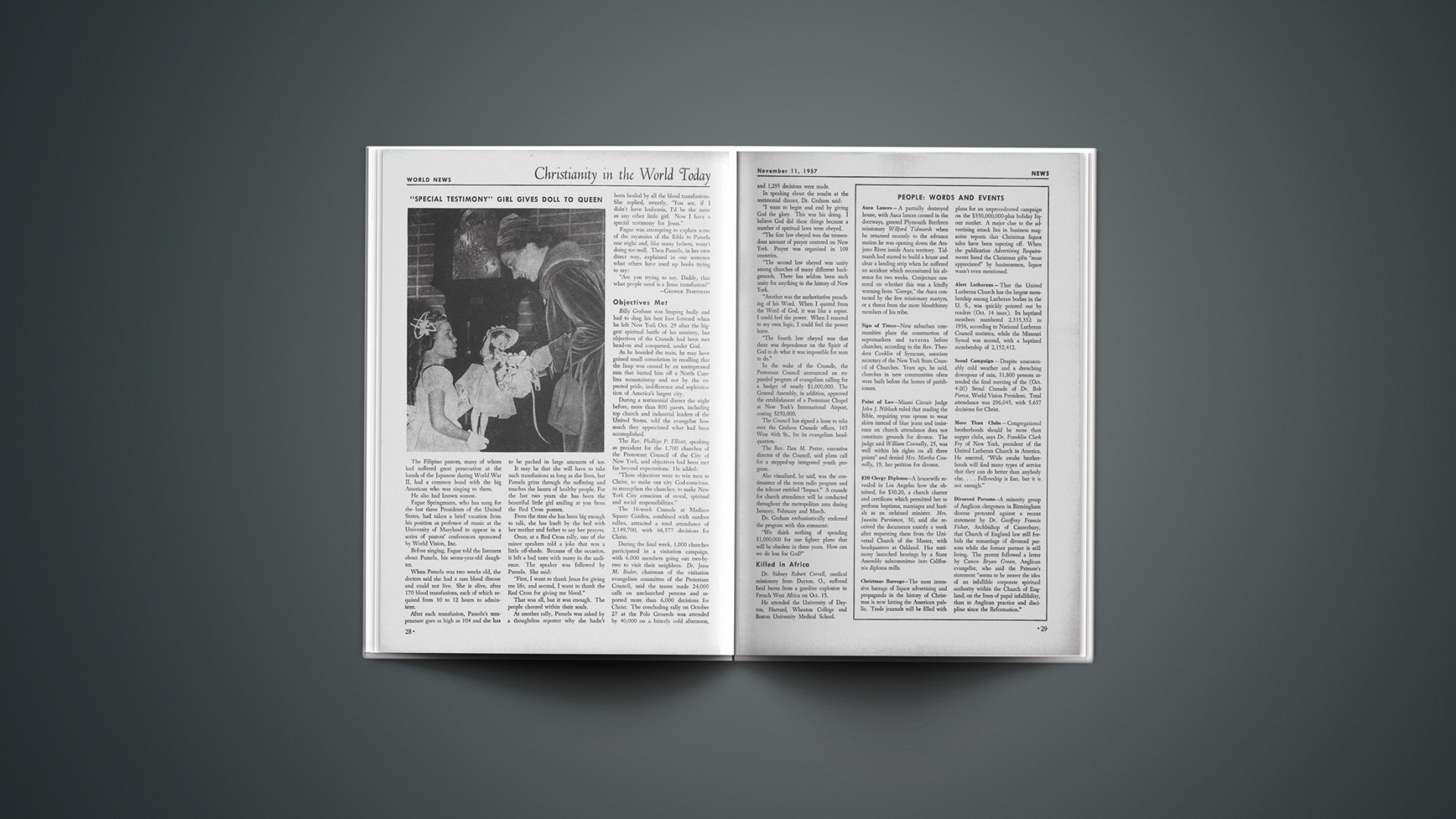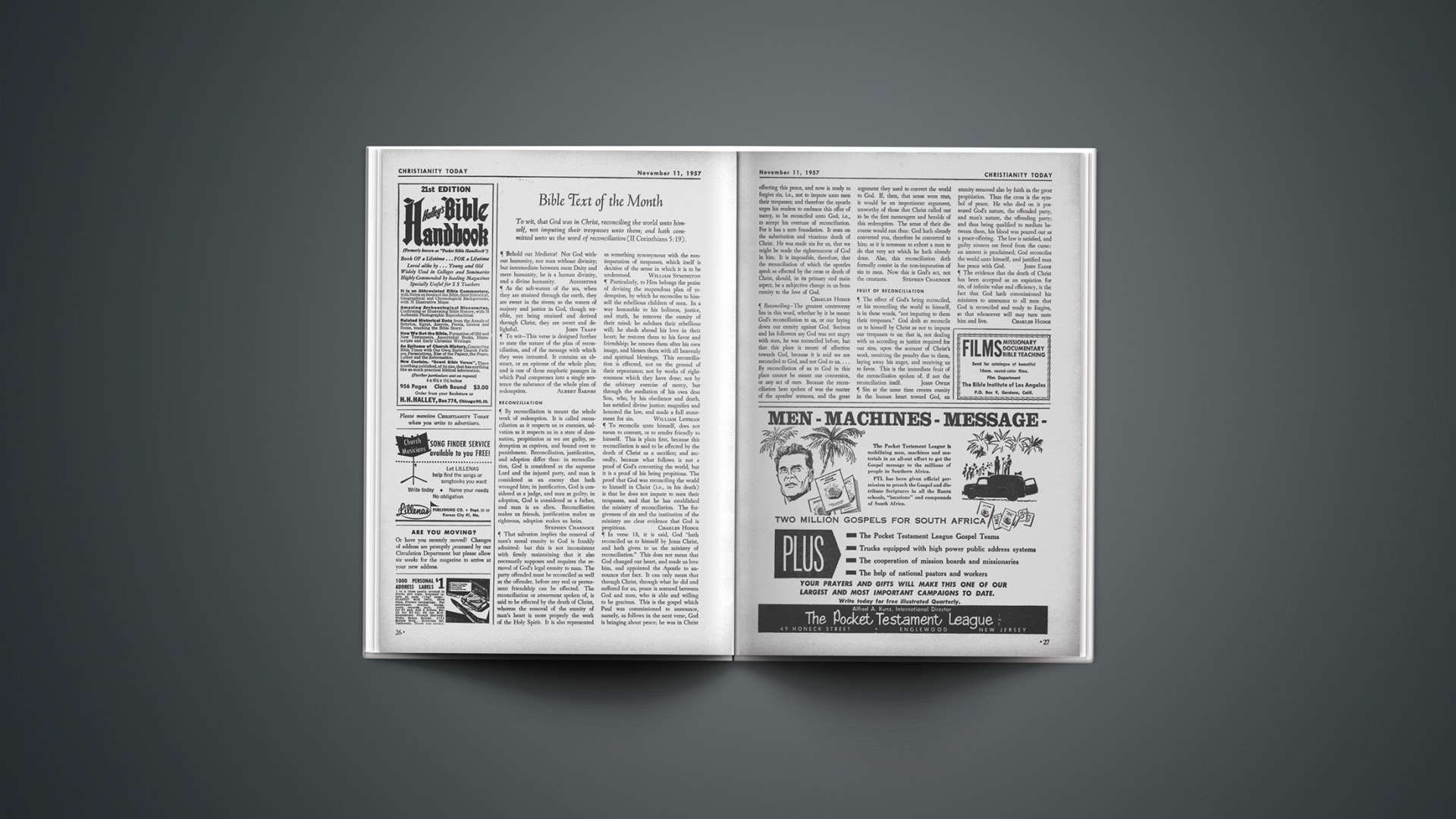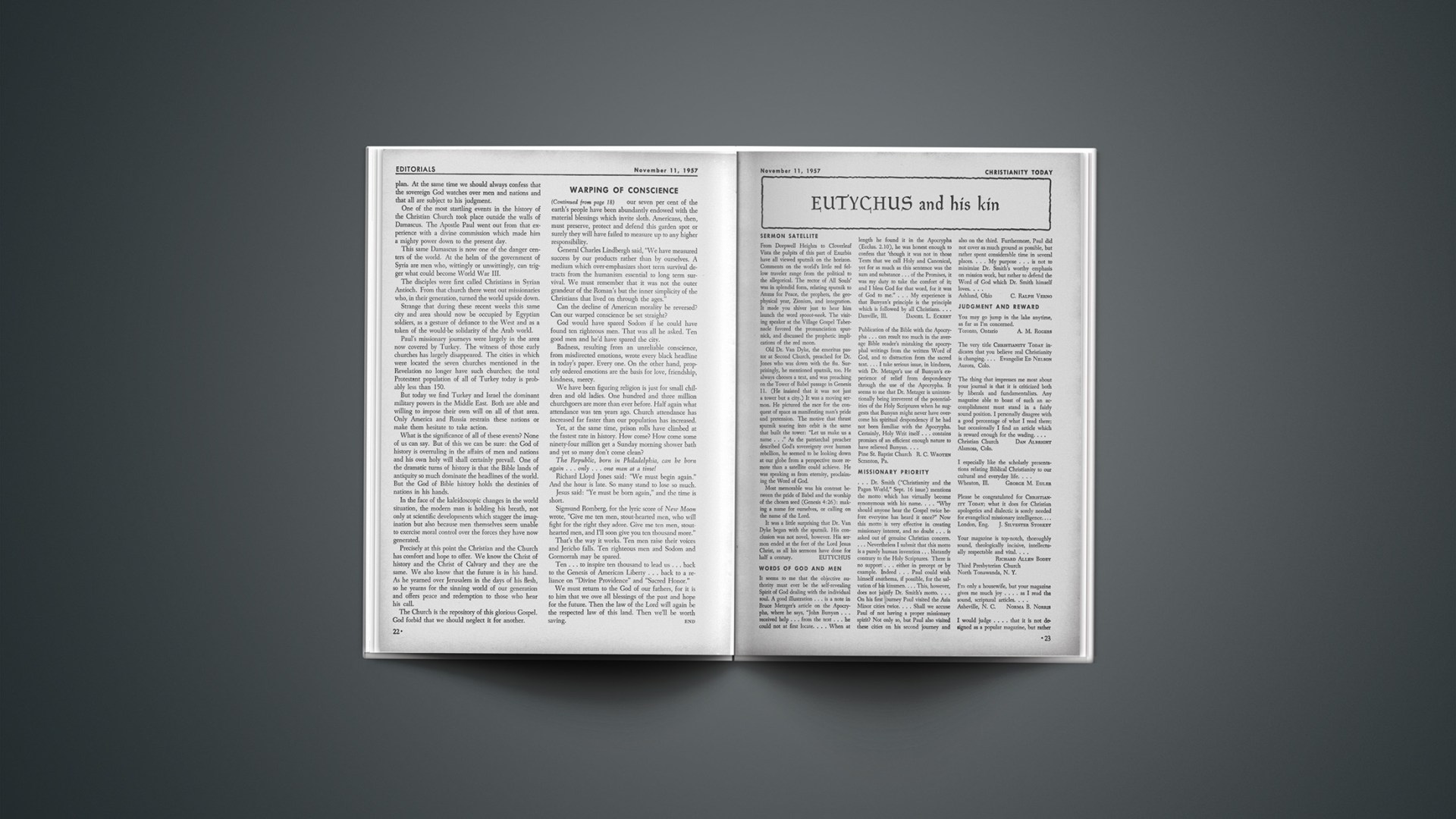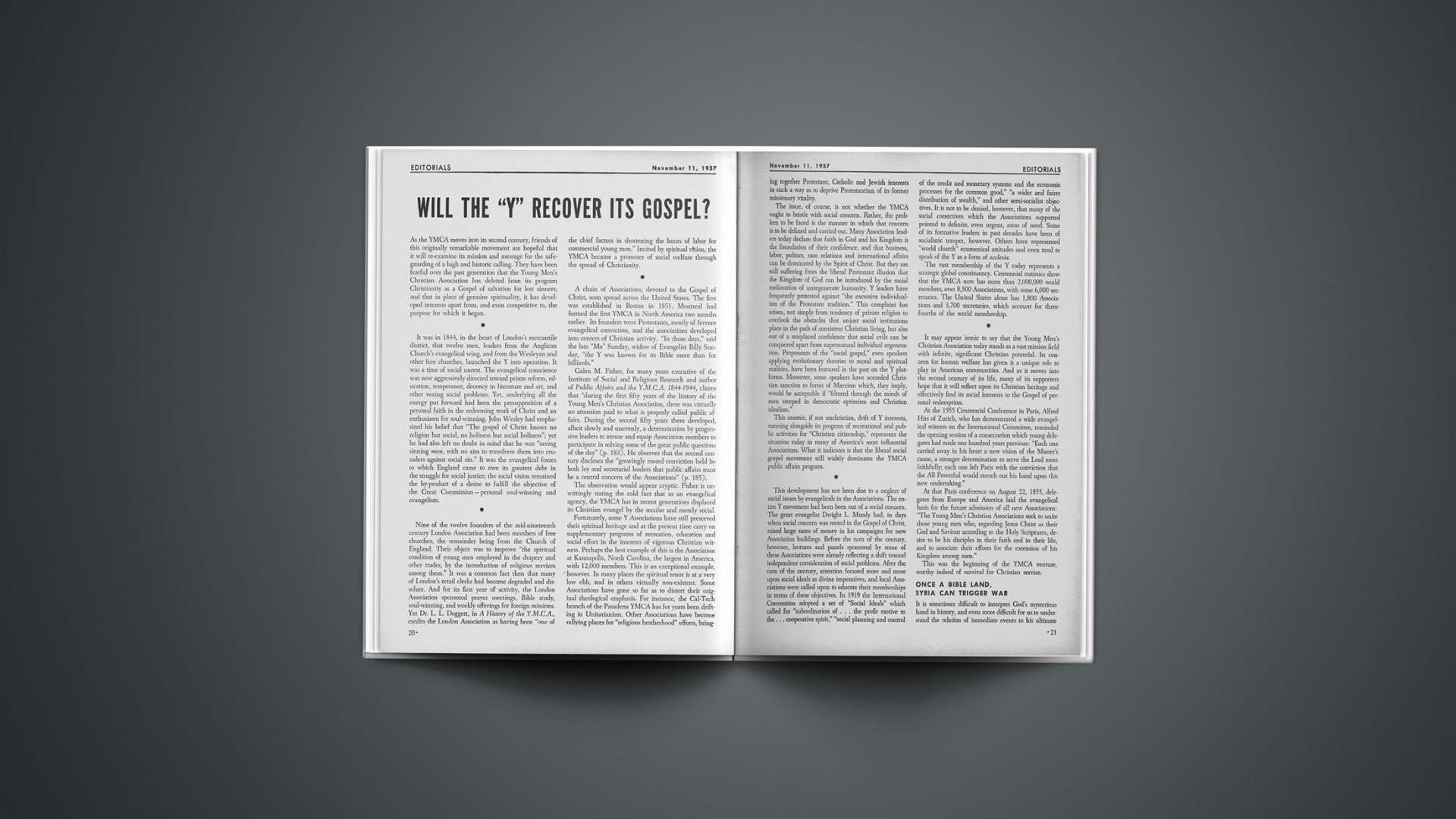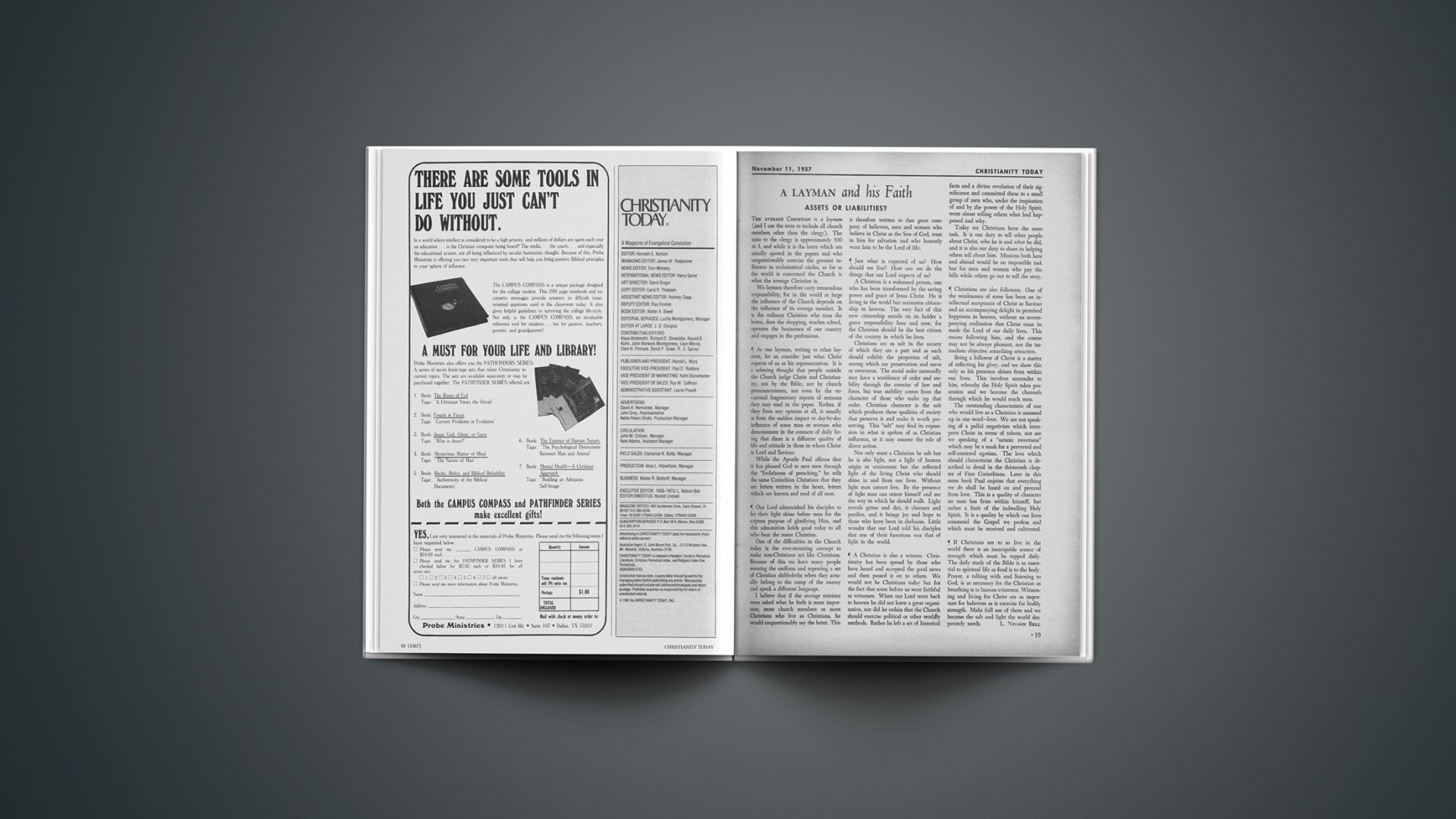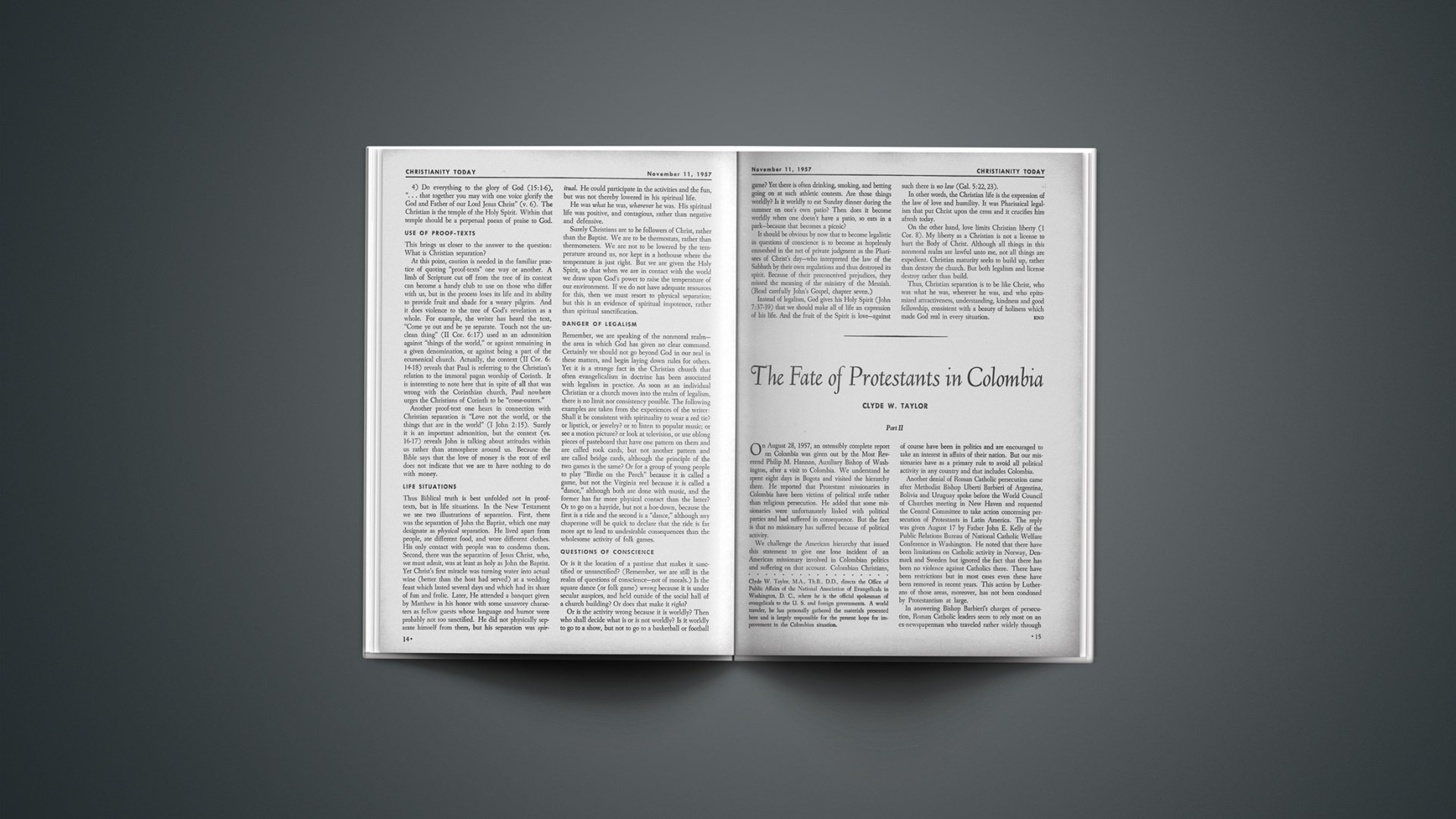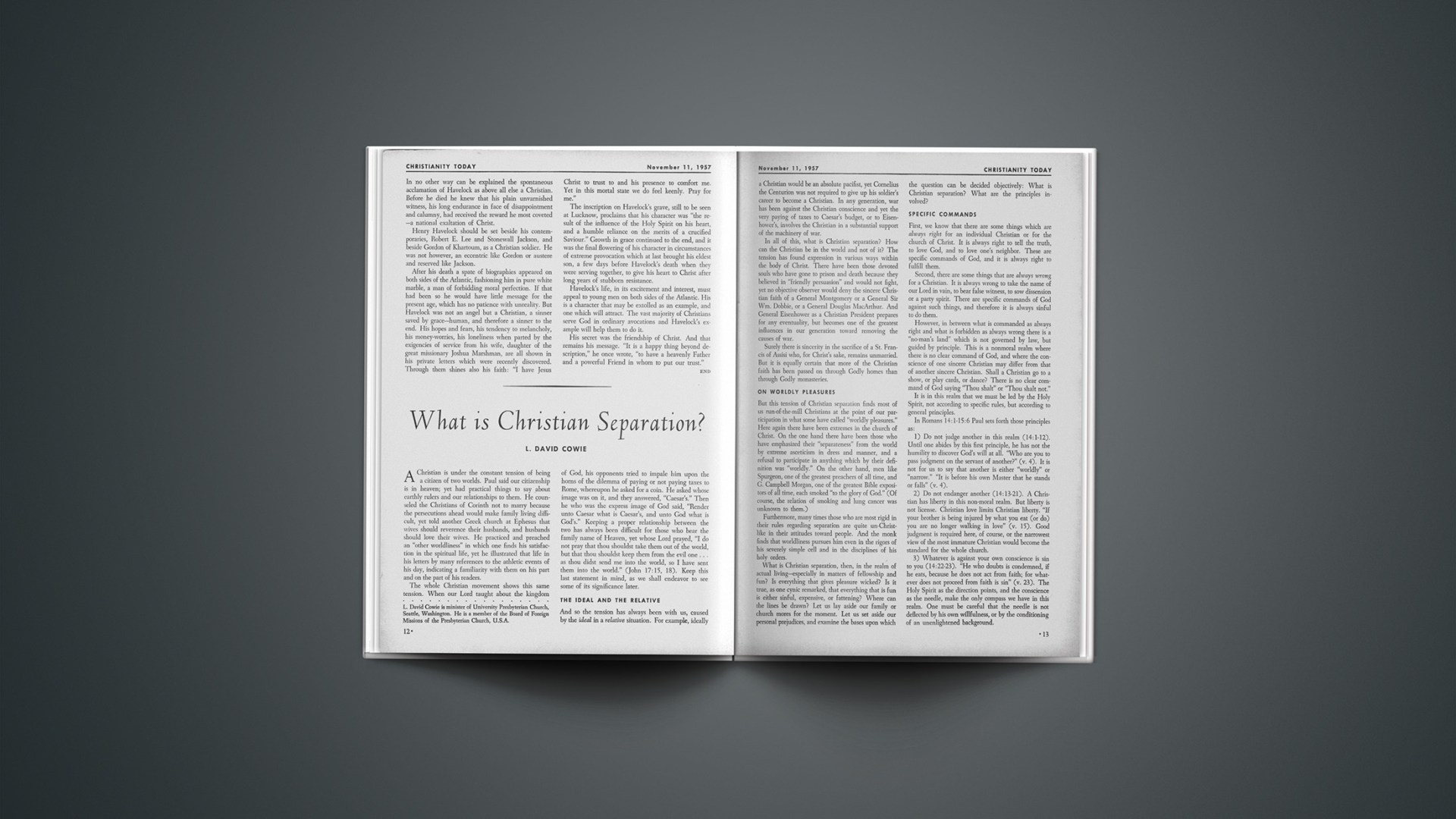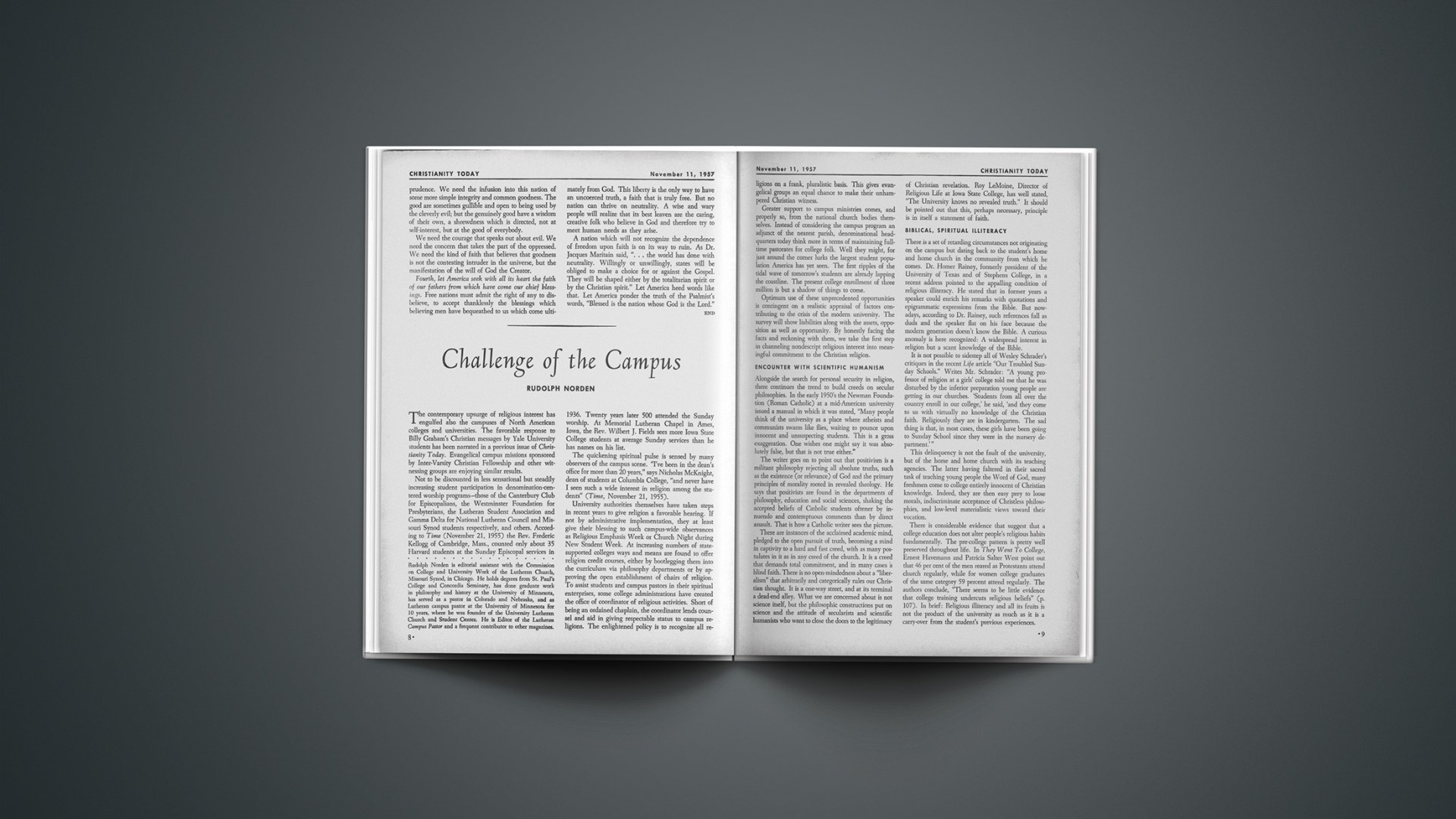Christianity in the World Today
The Filipino pastors, many of whom had suffered great persecution at the hands of the Japanese during World War II, had a common bond with the big American who was singing to them.
He also had known sorrow.
Fague Springmann, who has sung for the last three Presidents of the United States, had taken a brief vacation from his position as professor of music at the University of Maryland to appear in a series of pastors’ conferences sponsored by World Vision, Inc.
Before singing, Fague told the listeners about Pamela, his seven-year-old daughter.
When Pamela was two weeks old, the doctors said she had a rare blood disease and could not live. She is alive, after 170 blood transfusions, each of which required from 10 to 12 hours to administer.
After each transfusion, Pamela’s temperature goes as high as 104 and she has to be packed in large amounts of ice.
It may be that she will have to take such transfusions as long as she lives, but Pamela grins through the suffering and touches the hearts of healthy people. For the last two years she has been the beautiful little girl smiling at you from the Red Cross posters.
From the time she has been big enough to talk, she has knelt by the bed with her mother and father to say her prayers.
Once, at a Red Cross rally, one of the minor speakers told a joke that was a little off-shade. Because of the occasion, it left a bad taste with many in the audience. The speaker was followed by Pamela. She said:
“First, I want to thank Jesus for giving me life, and second, I want to thank the Red Cross for giving me blood.”
That was all, but it was enough. The people cheered within their souls.
At another rally, Pamela was asked by a thoughtless reporter why she hadn’t been healed by all the blood transfusions. She replied, sweetly, “You see, if I didn’t have leukemia, I’d be the same as any other little girl. Now I have a special testimony for Jesus.”
Fague was attempting to explain some of the mysteries of the Bible to Pamela one night and, like many fathers, wasn’t doing too well. Then Pamela, in her own direct way, explained in one sentence what others have used up books trying to say:
“Are you trying to say, Daddy, that what people need is a Jesus transfusion?”
—GEORGE BURNHAM
Objectives Met
Billy Graham was limping badly and had to drag his best foot forward when he left New York Oct. 29 after the biggest spiritual battle of his ministry, but objectives of the Crusade had been met head-on and conquered, under God.
As he boarded the train, he may have gained small consolation in recalling that the limp was caused by an unimpressed ram that butted him off a North Carolina mountaintop and not by the expected pride, indifference and sophistication of America’s largest city.
During a testimonial dinner the night before, more than 800 guests, including top church and industrial leaders of the United States, told the evangelist how much they appreciated what had been accomplished.
The Rev. Phillips P. Elliott, speaking as president for the 1,700 churches of the Protestant Council of the City of New York, said objectives had been met far beyond expectations. He added:
“Those objectives were to win men to Christ, to make our city God-conscious, to strengthen the churches, to make New York City conscious of moral, spiritual and social responsibilities.”
The 16-week Crusade at Madison Square Garden, combined with outdoor rallies, attracted a total attendance of 2,149,700, with 66,577 decisions for Christ.
During the final week, 1,000 churches participated in a visitation campaign, with 6,000 members going out two-by-two to visit their neighbors. Dr. Jesse M. Bader, chairman of the visitation evangelism committee of the Protestant Council, said the teams made 24,000 calls on unchurched persons and reported more than 6,000 decisions for Christ. The concluding rally on October 27 at the Polo Grounds was attended by 40,000 on a bitterly cold afternoon, and 1,295 decisions were made.
In speaking about the results at the testimonial dinner, Dr. Graham said:
“I want to begin and end by giving God the glory. This was his doing. I believe God did these things because a number of spiritual laws were obeyed.
“The first law obeyed was the tremendous amount of prayer centered on New York. Prayer was organized in 109 countries.
“The second law obeyed was unity among churches of many different backgrounds. There has seldom been such unity for anything in the history of New York.
“Another was the authoritative preaching of his Word. When I quoted from the Word of God, it was like a rapier. I could feel the power. When I resorted to my own logic, I could feel the power leave.
“The fourth law obeyed was that there was dependence on the Spirit of God to do what it was impossible for man to do.”
In the wake of the Crusade, the Protestant Council announced an expanded program of evangelism calling for a budget of nearly $1,000,000. The General Assembly, in addition, approved the establishment of a Protestant Chapel at New York’s International Airport, costing $250,000.
The Council has signed a lease to take over the Graham Crusade offices, 165 West 46th St., for its evangelism head-quarters.
The Rev. Dan M. Potter, executive director of the Council, said plans call for a stepped-up integrated youth program.
Also visualized, he said, was the continuance of the noon radio program and the telecast entitled “Impact.” A crusade for church attendance will be conducted throughout the metropolitan area during January, February and March.
Dr. Graham enthusiastically endorsed the program with this comment:
“We think nothing of spending $1,000,000 for one fighter plane that will be obsolete in three years. How can we do less for God?”
Killed In Africa
Dr. Sidney Robert Correll, medical missionary from Dayton, O., suffered fatal burns from a gasoline explosion in French West Africa on Oct. 15.
He attended the University of Dayton, Harvard, Wheaton College and Boston University Medical School.
People: Words And Events
Auca Lances—A partially destroyed house, with Auca lances crossed in the doorways, greeted Plymouth Brethren missionary Wilford Tidmarsh when he returned recently to the advance station he was opening down the Arajuno River inside Auca territory. Tidmarsh had started to build a house and clear a landing strip when he suffered an accident which necessitated his absence for two weeks. Conjecture centered on whether this was a kindly warning from “George,” the Auca contacted by the five missionary martyrs, or a threat from the more bloodthirsty members of his tribe.
Sign of Times—New suburban communities place the construction of supermarkets and taverns before churches, according to the Rev. Theodore Conklin of Syracuse, associate secretary of the New York State Council of Churches. Years ago, he said, churches in new communities often were built before the homes of parishioners.
Point of Law—Miami Circuit Judge John J. Niblack ruled that reading the Bible, requiring your spouse to wear skirts instead of blue jeans and insistence on church attendance does not constitute grounds for divorce. The judge said William Connelly, 25, was well within his rights on all three points” and denied Mrs. Martha Connelly, 19, her petition for divorce.
$30 Clergy Diploma—A housewife revealed in Los Angeles how she obtained, for $30.20, a church charter and certificate which permitted her to perform baptisms, marriages and burials as an ordained minister. Mrs. Juanita Purviance, 30, said she received the documents exactly a week after requesting them from the Universal Church of the Master, with headquarters at Oakland. Her testimony launched hearings by a State Assembly subcommittee into California diploma mills.
Christmas Barrage—The most intensive barrage of liquor advertising and propaganda in the history of Christmas is now hitting the American public. Trade journals will be filled with plans for an unprecedented campaign on the $350,000,000-plus holiday liqour market. A major clue to the advertising attack lies in business magazine reports that Christmas liquor sales have been tapering off. When the publication Advertising Requirements listed the Christmas gifts “most appreciated” by businessmen, liquor wasn’t even mentioned.
Alert Lutherans—That the United Lutheran Church has the largest membership among Lutheran bodies in the U. S., was quickly pointed out by readers (Oct. 14 issue). Its baptized members numbered 2,335, 352 in 1956, according to National Lutheran Council statistics, while the Missouri Synod was second, with a baptized membership of 2,152,412.
Seoul Campaign—Despite unseasonably cold weather and a drenching downpour of rain, 31,800 persons attended the final meeting of the (Oct. 4–20) Seoul Crusade of Dr. Bob Pierce, World Vision President. Total attendance was 296,045, with 5,657 decisions for Christ.
More Than Clubs—Congregational brotherhoods should be more than supper clubs, says Dr. Franklin Clark Fry of New York, president of the United Lutheran Church in America. He asserted, “Wide awake brotherhoods will find many types of service that they can do better than anybody else.… Fellowship is fine, but it is not enough.”
Divorced Persons—A minority group of Anglican clergymen in Birmingham diocese protested against a recent statement by Dr. Geoffrey Francis Fisher, Archbishop of Canterbury, that Church of England law still forbids the remarriage of divorced persons while the former partner is still living. The protest followed a letter by Canon Bryan Green, Anglican evangelist, who said the Primate’s statement “seems to be nearer the idea of an infallible corporate spiritual authority within the Church of England, on the lines of papal infallibility, than to Anglican practice and discipline since the Reformation.”
Power Of Prayer
The following excerpt is from a recent letter written by Mrs. J. Edwin Orr from South Africa to Mrs. Billy Graham in Montreat, N. C.:
“When Edwin was campaigning in a very remote part of New South Wales, more than 500 miles from Sydney, a Christian man approached him and inquired about the Hollywood Christian Group.
“He said he’d been looking at an Australian picture magazine more than four years ago, and his eye was attracted by a photo of an attractive girl with the caption, ‘The Prettiest Girl in England.’ Having had nothing to do with the movies, he was not impressed, but a strange conviction from the Spirit burdened him to pray for her conversion. He personally felt it was a waste of time, nevertheless, he kept on praying for the girl. In 1954, the burden lifted, as if the Lord said, ‘You do not need to carry this burden any longer.’ He had no idea whether the girl had died or was truly converted, for he had never heard of a movie star being converted.
“But he remembered her name—Joan Winmill—and when Edwin checked dates with him, he found that the burden had lifted during the (Billy Graham) Harringay Campaign (in London), when you were actually dealing with Joan! The man’s name is Ellwood Fischer, and he is a great man of prayer. Naturally, he was greatly encouraged to learn that many of the conversions in Hollywood were genuine and Joan Winmill’s also.
“Knowing that you must be in touch with Joan, I thought you might wish to tell her how a stranger in far-off Australia prayed so long for her conversion.”
Staggering Study
Nationwide estimates on the number of fatal highway accidents in the United States involving drinking need to be revised upward to nearly 50 per cent of the total annual motor death toll, according to William N. Plymat, speaking at the Loma Linda Institute of Scientific Studies for the Prevention of Alcoholism.
Plymat, an insurance executive, told the Institute that at least 15,000 lives could be saved annually if all accidents involving alcohol could be eliminated. He based his estimate on recent traffic and laboratory tests, and said that even small amounts of alcohol frequently destroy inhibitions of drivers to restrain themselves from misconduct while behind the wheel.
Bible For Cadets
A total of 503 cadets at the U. S. Military Academy, West Point, were presented Bibles recently in a ceremony sponsored by the American Tract Society of New York City.
Dr. Frank E. Gaebelein, president of the society, in delivering the sermon, said:
“The Bible is about history and morality, about human nature and sin. It tells not only about the past but also the future, about heaven and hell. It is about God and his greatness and righteousness, his justice and his love, and what he requires of us men. But, when we come to the more particular question, what is the Bible about, there is just one chief answer. It is this: Above everything else, the Bible is all about Jesus Christ. In the deepest and most living way, its purpose is to tell us about him who is ‘the wav, the truth and the life.’ ”
‘Peacemongering’
Queen Elizabeth II and President Eisenhower were in the congregation at Washington’s National Presbyterian Church when Dr. Edward L. R. Elson said “careless and irresponsible talk about peace” is “worse than warmongering.”
The pastor added:
“To talk about peace unrelated to moral principles is as dangerous for world order as saber-rattling and scowls at international borders.
“Jesus did not say, ‘Blessed are the peace-wishers.’ He did not say, ‘Blessed are the pacifists.’ He was quite emphatic. He said, ‘Blessed are those who make peace.’ ”
Others in the congregation included Prince Philip, Mrs. Eisenhower, Secretary of State John Foster Dulles, British Foreign Secretary Selwyn Lloyd, Chief Justice Earl Warren, Secretary of the Army Wilbur Brucker and Postmaster General Arthur E. Summerfield.
Benefits Hit
An advisory opinion issued by the Social Security Administration in Washington, D. C., threatens to restrict the benefits of retired ministers and missionaries who are provided homes by the churches and denominations they served.
The agency held that if the rental value of a parsonage is designated as income for social security purposes in computing base earnings for benefits it also must be counted towards the maximum of $1,200 a year that a retired recipient of benefits is permitted to earn while receiving such benefits.
Charles Smith, associate director of the Washington office of the National Council of Churches, said “the new social security ruling disrupts many of the retirement plans worked out by the Protestant denominations.”
He pointed out that nearly all denominations make provision for their retired missionaries and many churches provide for their retired ministers to continue occupying a parsonage.
“As a result, the amount of cash income they can have and stay within social security limitations is not more than $300 a year in most instances,” he said.
Africa
Moslem Prime Minister
A fitful drizzle could not dampen the spirits of thousands of Nigerians who crowded the roads to get a look at their new Prime Minister, Alhaji Abubakar Tafawa Balewa, and his newly-formed cabinet. For Nigeria, this was the last big step to independence, which is set for April 2nd, 1960. It opened a new era in the country’s government and is hoped to be the strong unifying force to pull the vastly tribalistic communities into one.
Balewa, who made his first trip to Mecca two months before, has always been the hero of the vast Nigerian North, often labeled the “Golden Voice of the North” because of his pleasing voice and excellent command of English. He once made the prophecy that the North would continue its march to the sea if the South felt it could go on for national independence alone.
In his opening speech to the House of Representatives he constantly stressed the need of unity—“On no account should we allow the selfish ambitions of individuals to jeopardize the peace of the 33 million law abiding people of Nigeria.”
Although a staunch Moslem by faith, the Prime Minister made a point of expressing his gratitude to what Christian missions have done for Nigeria.
“I would particularly like to refer to the Christian missionaries of all denominations who have done so much to encourage the development of the country,” he said. “They have the distinction of being the first in the field in spreading Western education and providing our peoples with modern medical facilities. We greatly admire their efforts and we shall continue to be grateful to them for all that they are doing.”
At the same time, the Prime Minister made it emphatic that “the future of this vast country of Nigeria must depend in the main on the efforts of ourselves to help ourselves.”
What a Moslem’s power will mean to Christian missions cannot as yet be told. But there is indication enough that the new Prime Minister, even though a Moslem, is dedicated most of all to strengthening the unity of the country in an effort to present it as eligible for independence from British rule. And for the present at least, the Prime Minister, in order to accomplish such a task, is doing all he can to bring economic, political, and religious groups into peaceful and harmonious coexistence.
J. L. J.
Going Again
The Nile Mission Press, founded more than 50 years ago in Cairo, Egypt as a center for the printing and distribution of Christian literature in the Arabic language for all of the Middle East, has resumed operations under a new set-up in Beirut, Lebanon. A program of publication work is being organized under direction of D. T. L. Howell there, in cooperation with a committee in England and America.
Nile Mission Press, whose work was interrupted last year at the time of the Suez crisis, was founded in 1905 by Samuel M. Zwemer and others, and throughout its long history has carried on a far reaching literature ministry in all of the Near and Middle East. At one time its catalog carried more than 800 titles of books available in Arabic. Renewal of the work in Beirut is being expedited by the formation of a committee of national Christians and with the cooperation of missions in the area. An office has been set up and the first list of new titles approved for printing and distribution, with George Jamil, a Lebanese, to assist Mr. Howell.
Far East
My Only Regret …
Portrait of a pastor, whose ministry changed from frustration to fruitfulness:
The little Korean, sitting alongside me on the one-hour flight from Seoul to Taegu, was in his 60’s. His face was lined from evident years of a hard life, but a deep calm seemed to radiate from him.
Traveling with the old gentleman was his son, a young man who smiled easily. They were the Rev. Yong S. Rhee, president of the Taegu School for the Blind and Deaf, and Kisu Rhee, his special assistant.
“My father has been the biggest inspiration in my life,” remarked Kisu. I thought of how refreshing this simple statement sounded, compared to the “old man” references heard so often among American teen-ages.
As we rode and talked, there developed the remarkable story of a man who can well be an inspiration to everyone.
The story really began, as is so often the case, with the sacrificial life of a mother who dedicated her son to God after she became a Christian and had her sight restored following seven years of blindness. In order to pay for her son’s education, she walked hundreds of miles year after year, peddling goods throughout North and South Kyongsang. Less than five feet tall and not very strong, she was continually racked by physical suffering as she struggled up mountain trails and crossed fields with her merchandise. But her strength was renewed daily, as she looked at the Cross and remembered the suffering of Jesus.
While at school, the son worked hard and served God devoutly. He showed such progress that he was invited to lead a church service in Taegu. At night he found time to practice his oratory in the market place.
“I was painfully conscious, however,” he said, “that my faith was not genuine, but only disguised.”
He related the troubles which began in 1919, the year of a major upheaval against Japanese imperialism. For his rebellious shouting, he spent one year in jail at Seoul. After release he refused to quit making speeches and spent three more years in jail at Taegu. A jailor’s cruel blow resulted in partial deafness.
“While suffering under this imprisonment,” he testified, “I realized more clearly my mother’s intention that I should be a pastor. I resolved to be a good one. After prison, I left for Japan to study at Kobe Seminary.
“After graduation, I still did not have a true belief in the grace of God. While desperately seeking this belief, I offered my life in the service of lepers. Two years after I joined the leprosarium, however, I resolved that I would quit my ministry unless God bestowed his grace upon me. The decision didn’t come easily. I tortured myself in prayer for several weeks but nothing happened until Christmas eve. During the 3 a.m. service, I asked, ‘Lord Jesus, have you ever seen such a sinner as I? Has there ever been such a wicked pastor? You love these lepers most of all human beings, erected this leprosarium and sent me to love them for you, but I did not love them. I am not a benefactor, but one benefitted.’
“While praying, my eyes overflowed with hot tears. Four hundred patients also shed tears of repentance. The whirlwind of grace sent by God never ceased to blow until the service had lasted five hours.
“After this, I could serve the patients with true love. I served them sincerely for 10 years under the protection and grace of God.”
Rhee, after this service, accepted pastorates in Korea, Manchuria and Japan.
With the liberation in 1945, he came home to Taegu. The leper-relief position was no longer open, but God had another big work for the faithful pastor. Park Yon Saeng, a blind man, impressed him with the importance of education for blind and deaf children. The school was opened on faith in 1947.
Money was hard to come by. To help support his young charges, he took over the job as labor section chief at Taegu jail and devoted the rest of his time to the school. The arrangement wasn’t satisfactory, in view of the great need among thousands, so he quit the jail job after seven months.
Monetary aid picked up slowly. Offerings on Christmas, 1949, from blind men and women across the United States, were sent to the school through Miss Helen Keller. The mayor of Taegu, Han Po Yong, provided desperately needed land.
The work was progressing wonderfully in 1950—when war again came to Korea. By August 30, the enemy was 120 kilometers northeast of Taegu. Refugees below Seoul were streaming southward.
In an attempt to rescue relatives at Songjiu, Rhee crossed the Naktong River on the same day that UN forces pulled back across the river. Shells began to fall all around. He hid in the mountains, among rocks and behind hedges until the day he was captured, Sept. 17—on charges of being a jail chaplain.
He arrived at a compound for prisoners just as those who had been murdered were being taken away. As his time for execution approached, an unusual order for reconsideration came through. But on Sept. 24 he was again sentenced to death.
“I was not troubled by the fear of death,” he said, “but by the fact that I had not been a better pastor and had not rendered more worthy service to the lepers and school for the blond.”
When given a chance to say his last words, he told the Communists why he had become a pastor and ended the little speech with these words: “I fear nothing, since I shall be in the Kingdom of Heaven after my death. My only misgiving is who will be my successor in the education of the blind and deaf.”
God intervened again, as a Communist official was touched by the words. “Set this old man free,” he ordered.
Returning to Taegu, Rhee found over 1,200 lepers and children praying for his safety!
More than 250 blind and deaf children are now taught how to live at the school, with World Vision, Inc., of Los Angeles, paying for the support of 185. World Vision, under President Bob Pierce, has made other valuable contributions to bolster support from Korean groups.
I walked through the corridors and watched the children at their studies. A blind boy smiled at something he was reading with his fingers. A deaf boy, who had never heard sound, struggled with the words, “How do you do … welcome.” Hundreds of hours of patient love and coaching had gone into the effort. Kim Jae Yul, a 14-year-old boy, was with a group of other children. He was blind and part of his right arm was gone as the result of a stray explosive picked up after the fighting, but he smiled as he sang a song, “I Need Thee Every Hour.”
Looking on proudly was the Rev. Yong S. Rhee, spared by God for a great work. He had been as blind in the beginning of his ministry as the children he was helping, but God had opened his eyes with bitter tears on Christmas morning in a leper colony.
—GEORGE BURNHAM
Korean Moderator
The Rev. Chen Pil Sun, pastor of Seoul’s Yong Dong Presbyterian Church, was elected moderator of the Presbyterian Church in Korea at its 42nd General Assembly in Pusan.
The new moderator, a former secretary of the National Christian Council in Korea, won fame for his dramatic escape from Seoul’s notorious West Gate Prison in 1950 when he was being held for execution after capture by the communists. All his fellow prisoners were killed. Koreans call him “the man who jumped from his coffin.”
A highlight of the assembly was the welcome given to the Rev. Pang Chi Il, last Presbyterian missionary to be released by the Chinese communists. Mr. Pang is a second-generation China missionary, the son of one of Korea’s pioneers to Shantung province. He had been in China without furlough since 1937 and had been held with his family for eight years by the communists.
Continuing its insistence on high standards for the ministry, the assembly’s committee on examinations passed only 60 out of 130 candidates applying for admission to the Presbyterian ministry.
—S. H. M.
South America
Overflow Crowds
Dr. Oswald J. Smith, pastor of The Peoples Church, Toronto, has completed evangelistic campaigns at Rio de Janeiro and Sao Paulo in Brazil.
Overflow crowds were reported in each city, with a total of 1,579 registered decisions for Christ.
CHRISTIANITY TODAY is a subscriber to Religious News Service, Evangelical Press Service and Washington Report.

